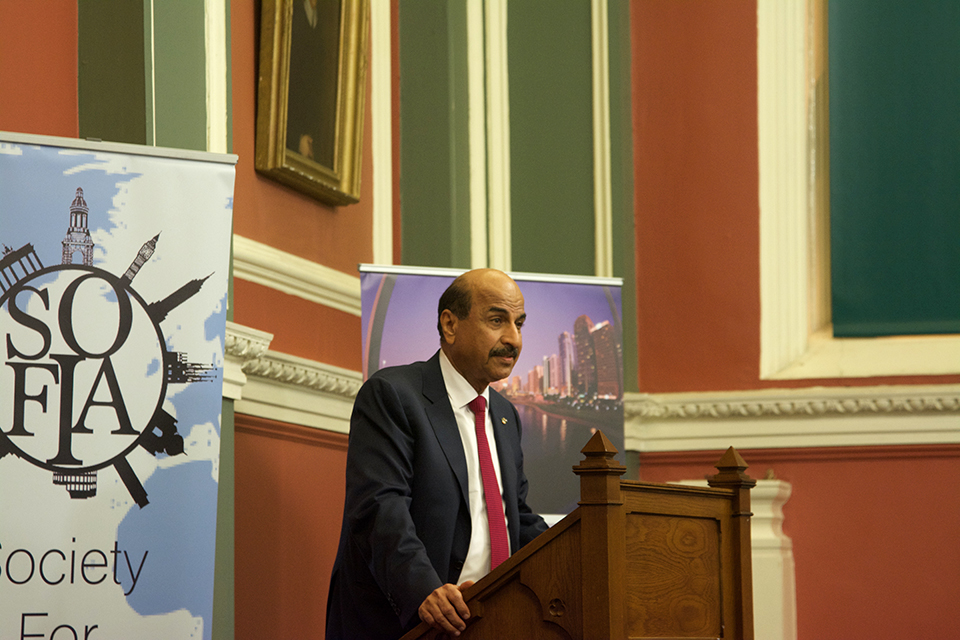
Last night saw the Society for International Affairs (SOFIA) welcome the Ambassador of the United Arab Emirates (UAE), His Excellency Dr. Saeed Mohammed Al Shamsi, to Trinity. Over the course of his distinguished career, Dr Al Shamsi has also served as Ambassador to Norway, Denmark, Sweden, India, Australia, New Zealand, and, most notably, as Ambassador to Germany when the Berlin Wall came down.
The Ambassador began his talk by pointing to the banners which surrounded him on the stage. Depicting some of the skyscrapers for which the UAE is now famous, he remarked that they were a testament to the rapid development his country has undergone. Since independence in 1971, the United Arab Emirates went from a land of “tribes on the move, with no schools, no education”, to one of the richest nations on Earth.
The topic of his speech was “Religion and Pluralism in the United Arab Emirates”. The Ambassador spoke at length on the importance of multiculturalism in the development of Emirati society. The United Arab Emirates is notable for its large non-national population: just 15 to 20 per cent of its nine million-strong population were born in the country, and he spoke of this as a success of the country: “People come out of the church, others come out of the mosque and they live in peace with each other – this multiculturalism is the real force behind the development of the UAE.”
On the topic of religious freedom, the Ambassador drew from his own views and experience. While acknowledging that the constitution is based on Islam and Sharia, he maintained that there is mutual respect and understanding between the various faiths present in the UAE: “There is more than just the Arabic language. There is more than just Islam.”
Al Shamsi contrasted his own understanding of Islam with the image that is often portrayed in the media, claiming that Islam is “one of the most peaceful religions”. He cited the traditional Arabic greeting Salam Alaikum – which means “peace be upon you” – as an example of this.
To those who use religion to justify violence, the Ambassador was blunt: “That’s not Islam, it’s political interests.” He named Iran as one of those engaging in this politicisation of faith, and accused them of causing “headaches” throughout the Middle East. Wrapping up his speech, he summed up his own beliefs: “Religion is supposed to bring society together, rather than separate them.”
While extolling the values of tolerance and respect, Al Shamsi was challenged during the Q&A session on the rights of non-nationals in his country. A questioner asked him if it was fair that non-nationals cannot avail of the same citizenship and pension rights upon retirement as native Emiratis, even if they have worked there all their life. The Ambassador dismissed this concern, stating that “rights have limits”. Workers are hired on contracts with individual businesses, he claimed, but could still benefit from the same legal rights as native citizens.
He was also asked about whether his approach to religion could be applied to the situation in Northern Ireland. Having studied the conflict in university, he replied he believed that the differences which led to the Troubles were largely political rather than religious. Still, he maintains a belief that the “new generation is the future of Ireland”, and he hopes that North and South will someday unite.






